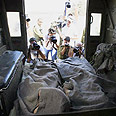

According to Y, the Hamas leadership in Gaza is experiencing "deep strategic complications." The organization is frustrated by its lack of success in gaining legitimacy in the international arena, particularly in Europe.
They are also having trouble running the government, particularly in controlling internal checkpoints and, in general, in positively impacting daily life.
This situation increases the likelihood that the organization's policy regarding terror attacks with change, in Gaza, the West Bank and possibly even outside of Israel, the deputy Shin Bet chief said.
Increased smuggling and use of weapons
Arms smuggling has not only continued, it has increased, Y reported. In the few months since Hamas' took over Gaza in June of this year, 40 tons of weapons have been smuggled into the Strip – approximately one half of the total amount of armaments smuggled into the area since Israel's July 2005 disengagement.
Since August, the defense establishment recorded five major incidents of arms smuggling through Egypt, during which 13 tons of explosives and 150 RPG (rocket-propelled grenade) carriers were brought in. Simultaneously, there has been an observable decrease in Egypt's measures to combat the trend.
Not surprisingly, the deputy chief stated that armed attacks against Israeli communities and forces had increased. There were 20 Qassam attacks last week, a high number relative to the average of 70 rockets per month.
The number of shooting attacks from Gaza (gun or mortar fire towards the border fence or into Israel) also increased in the past week – up to 56, in comparison to 43 attacks the week before. The heightened mortar fire, specifically, was a response to the IDF's operations within Gaza, Y explained.
Hamas also intends to intensify activities against Egypt in order to exert pressure on them to open the Rafah crossing on the Gaza-Egypt border, he said.
While Y's briefing focused mainly on the situation in Gaza, he said the Shin Bet is also following Hamas operations in Nablus, in preparation of a possible terror attack being planned in that West Bank city.
Local population blames Hamas
The atmosphere in Gaza indicates that the local population blames Hamas for the current crisis there, Y said. While significant harm has not been caused to mechanisms for distributing humanitarian aid in Gaza, the Shin Bet has noted that the local private sector has sustained severe damages since the Hamas takeover.
In contrast to the situation in the Strip, the financial situation of the West Bank's private sector has improved in recent months, highlighting the economic separation between the two regions and particularly the negative consequences of the takeover for Gaza businessmen.
Additionally, the municipality workers' strike continues, leaving Gaza streets overflowing with trash.
Despite these troubles, the Hamas leadership does not appear to be facing any significant internal threat to its control of Gaza.
Efforts towards conciliation between Hamas and the Palestinian Authority have not yielded tangible results. Y noted Palestinian President Mahmoud Abbas' recent cancellation of government appointments for members of the Islamist group. West Bank Hamas members also continue to be arrested.















